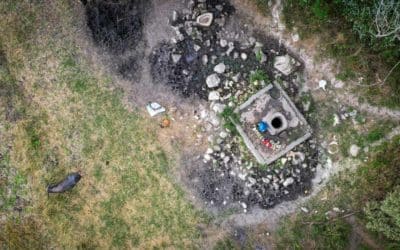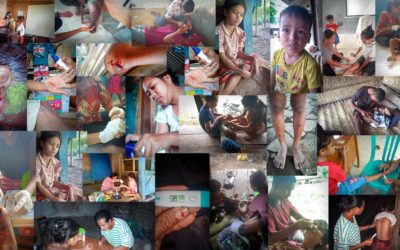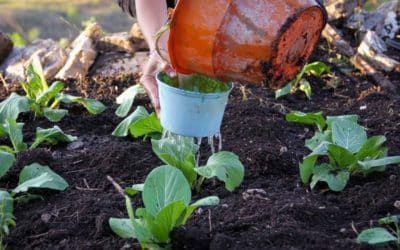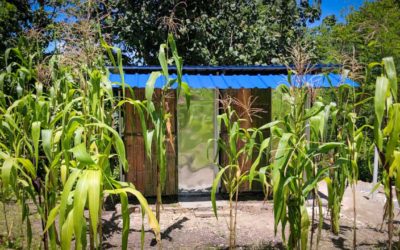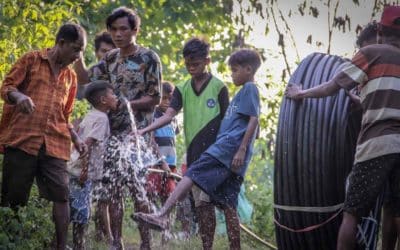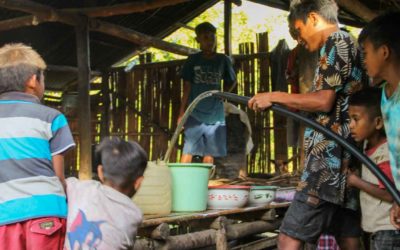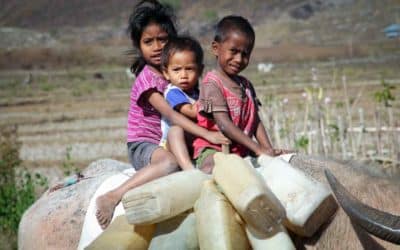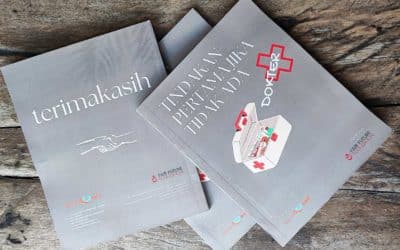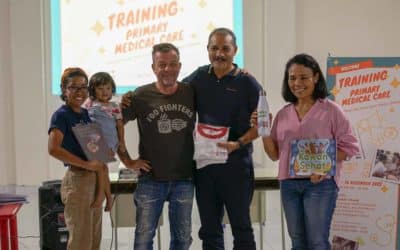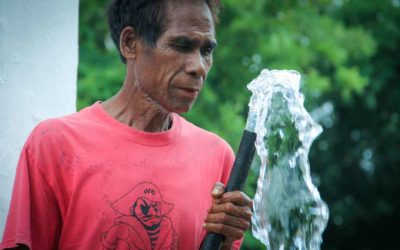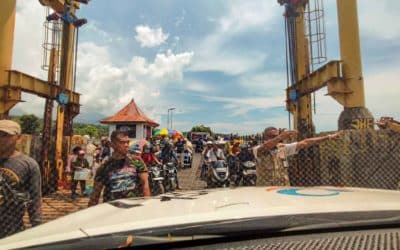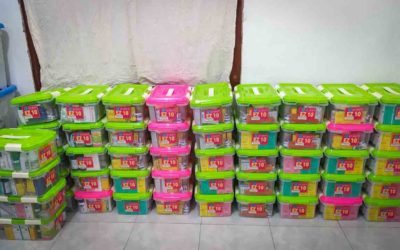Children can't learn effectively in darkness or when suffering from chronic infections. By electrifying schools, improving nutrition, and providing treatment for common illnesses, we create safe environments for learning and development. In this way, education acts as a shield against poverty and social exclusion.
Donate
Support Care
Programs
All projects
Quick News
Field updates
Stories
Field stories
Fair Future’s Picture of the Day unveils unseen rural realities through authentic field images.
Each photograph captures the raw truth of our daily mission in the most remote areas of Indonesia.
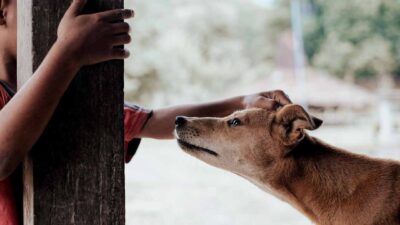
Fair Future’s work addresses health and wealth disparities in ultra-rural regions through community-based programs.
One Picture – A Story of Reality, Resilience, and Action
At Fair Future, we hold the belief that a single image can convey a truth that no written paragraph could ever capture. Our “Picture of the Day” serves as more than just a photo; it offers a glimpse into the daily lives in the world’s most overlooked regions.
Captured by our teams in the depths of rural Southeast Asia, particularly Eastern Indonesia, each image stands as a direct testament to the realities we witness, endure, and support.
These photos reflect genuine, unfiltered moments—Kawan Sehat health agents tending to patients in clinic-less areas, children gathering water from wells we constructed, a mother transporting her child across arid land, or the quiet fortitude seen in a face etched by malnutrition and illness. Each picture tells a tale of medical urgency, social injustice, isolation, and remarkable resilience.
This page showcases those stories. Through each image, we reveal the silent struggles we observe and the dignity of those who battle them. They are unposed, raw, and candid—taken by us, amid the mud, under the sun, and through the long nights.
“A photo speaks when words fall short. This is our everyday reality, captured with heart and grit.” — Alex Wettstein, CEO and Founder of Fair Future
Every photo demands awareness and action. We encourage you to look closer, experience our feelings, and join us—one story, one truth, one picture per day.
Alex Wettstein – Fair Future Foundation – Updated in May 2025
Our last News
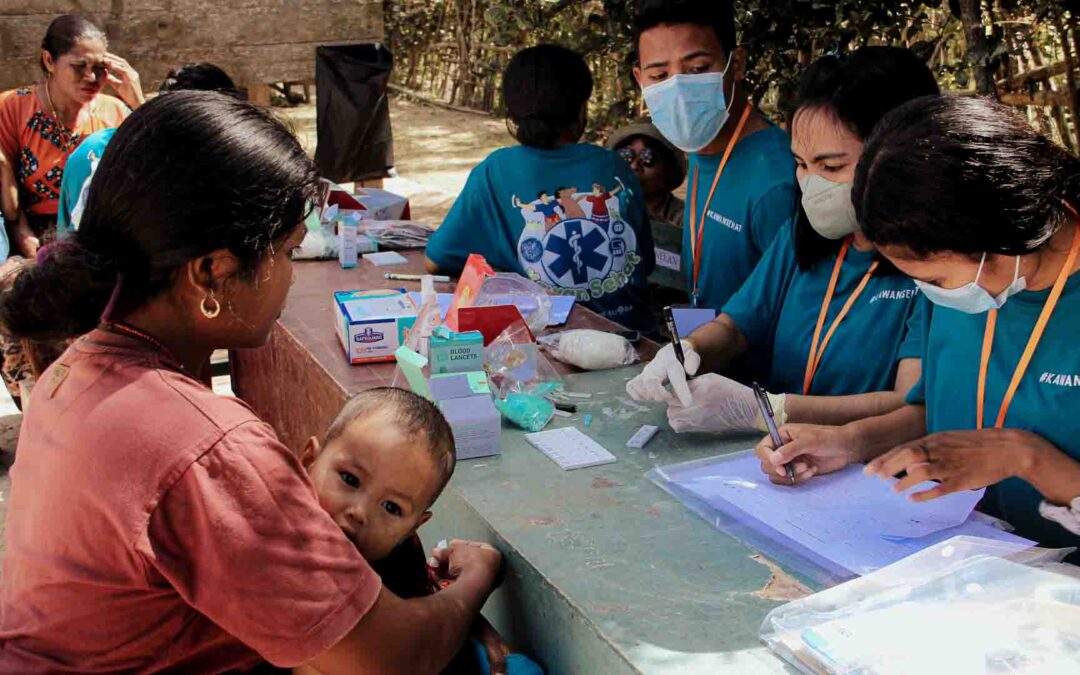
Malaria Screening in Rural Indonesia | Swiss Medical Fieldwork
This image is in 1920x1080 resolution. Click on it to enlarge and view at full size.Medical teams conduct rapid malaria testing and education in remote villages to protect children and vulnerable families. This new Photo of the Day captures a moment that repeats...
Our last pictures of the day
A traditional well in a rural area of East Sumba
This "picture of the day" shows you how families manage to have water at home for eating, drinking, bathing, taking care of children, watering livestock and animals, and watering gardens.
The vast majority of villages in this region, where Fair Future and Kawan Baik have been operating for so many years, do not have access to clean water, among other things! This well, dug by hand by the villagers themselves, is about 15 meters deep.
Most of the time, it is dry, or when it has water, it is of a colour that does not encourage consumption. It can be brown, beige, or chocolate, even with a little "consistency, thick" when there is little water in the well: This is because of a mixture of soil, sediments, bacteria and others microbes which reproduce there favourably. Or, it can be really white because the level of limestone is too high. In all cases, and of all colours, this water is bad and, in the medium term, dangerous for the health of families.
Teachers in rural villages heal and save lives!
The magic of this "Primary Medica Care" program? It's just that it's unique in the world and it works. The first promotion of about sixty teachers who have followed the training in primary medical care in rural areas, tells us about their "exploits" and their work as first aiders. They gain self-confidence, that's the most important thing, and we note it.
The teachers, in their village and thanks to the knowledge and medical care equipment they acquired during the courses last December, provide medical care for injured or sick children. Medical care is provided and lives are saved.
Having water allows them to drink and eat, to live better
This "Picture of the Day" shows you a person watering their garden in order to grow their own vegetables for the family at home.
The Water Connections program works wonderfully, water makes things possible here in East Sumba, and that's what it's all about. Clean water at home for eating, drinking and having a healthy life.
For months, Fair Future and Kawan Baik Indonesia foundations have seen a fundamental change in the habits of families who benefit from the "Water Connections" program. Gardens are created, mainy gardens actually. People eat better, drink more, have more energy and are less sick. This observation fills us with joy and comforts us in our choices and decisions. Access to better health has always been the foundation's primary mission, and healing people by giving them water is incredible.
Gardens appear in front of the small houses of wood, earth and bamboo, on the site of our school and everywhere in the village, near one of the thirty water tanks we have built. Previously, water for watering gardens was not a family's priority, with only a few litres a day available for everything. Consequently, new activities are created, and new opportunities arise. Families are gradually being rebuilt. They acquire a healthier life, and they are much healthier too.
Water Connections – This is the name of this vast program managed by the Fair Future and Kawan Baik foundations. It gives access to clean water and healthy toilets to the rural populations of Indonesia.
New sanitary facilities for a healthier life
This "Picture of the Day" shows you the healthy sanitation facilities we are building here in East Sumba. Having provided access to drinking water – through the Water Connections program – to these 270 families in Mbinudita, East Sumba also offers the possibility of having toilets for the first time in these villages. And it was unimaginable a few months ago for these families living in rural areas.
Can you imagine what the health consequences are for these hundreds, these thousands of families who defecate behind a tree or the house? In a hole and having no water to flush the place? We see it every day here. Sick children suffering from diarrhoea are the daily life of our medical teams.
The Fair Future and Kawan Baik foundations have made more than 20 sanitary fixtures, many of which look like this. Clean and hygienic, with water to rinse them off after use, showers to wash up, and safety tanks to collect wastewater. And now families have a healthier life. People are less sick, children suffer less from diarrhoea, and infant mortality is decreasing and will continue to decline.
Water Connections – This vast program is supported by the Fair Future and Kawan Baik foundations. It provides access to drinking water and clean toilets to rural populations in Indonesia.
HDPE pipe rolls that we use to create the Water Connections.
In this "Picture of the Day", taken at the end of last December, our on-site teams are busily unrolling a 250m roll of HDPE pipe. The children of the village of Mbinudita gather at the pipes to drink fresh, clean and healthy water which flows there. This is the first time in their lives that they drink water of this quality from a pipe.
From the three deep boreholes we have drilled, we are connecting over 30 water tanks, over 20 sanitation facilities and all numerous other infrastructures that Fair Future and Kawan Baik foundations have built over the past 20 months in East Sumba. Each water tank has a capacity of between 7500 and 3500 litres of clean and safe water. Each bathroom has two toilets, showers, water point for washing clothes.
These Water Connections – from the name of this vast program managed by the Fair Future and Kawan Baik foundations and which provide access to clean water to the rural water populations of Indonesia – are made thanks to these enormous rolls of pipes HDPE thermoplastics. To date, it's more than ten kilometres of HDEP pipes that all of us here have pulled, buried, connected and powered to provide access to drinking water to more than 2700 people here in #Mbinudita.
Clean water in the house for the first time
Last December, while we were on site here in the village of Mbinudita, the Fair Future and Kawan Baik teams linked several infrastructures built for and around the Water Connections project by means of + /- 4000 meters of PVC HDPE pipes which we have now buried.
In doing so, we entered a significant number of houses, and for the first time in the history of these families, they had running water directly in the kitchens. You had to hear the cries of joy, the laughter too. And tears of joy for these families who suddenly have access to a source of clean water at home. Water connections create a clean and safe water network for families from rural areas in eastern Indonesia.
This image of the day shows you one of those very emotional moments, during which our teams entered one of the houses with a 1-inch pipe to connect it from the second deep borehole to the reservoir which is there and that we have built.
A Lifetime work: Collecting water for the family
When there is no water on-site, and you have to fetch it, it is mainly women and young girls who take up their time and miss out on opportunities.
For women, the opportunity costs of water collection are high and have far-reaching implications. Having to fetch water drastically reduces the time they can spend with their families and care for their children, do household chores or even enjoy hobbies. For both boys and girls, collecting water can interfere with studies, sometimes even preventing them from going to school altogether.
Collecting water can harm the health of the whole family, especially children. If there is no access to water at home, even if the water comes from a safe source, the fact that it is transported and stored increases the risk that it will be contaminated with faeces before it is used.
Water Connections: Our teams are changing that; for years, we have been designing, manufacturing and supplying water connections to villages in ultra-rural regions. Fair Future improves life for tens of thousands of people.
Primary Medical Care in Rural Areas – The book
“The first step when there is no doctor” includes fourteen modules of theoretical training and practical exercises explaining how to act in the event of a medical emergency. It is intended for teachers in rural schools of East Indonesia.
This book was entirely produced by the Fair Future and Kawan Baik foundations. It is based on the book "Where There Is No Doctor" by David Wegner.
From now on, it serves as a reference work for the training of teachers in the rural areas of eastern Indonesia. This book includes all the information on prevention, patient care, first aid and how to treat a wound, burn or bite. He learns to give essential drugs, cardiac massage and all the gestures that save a life.
You can see the work done by the foundation's medical teams here in the .PDF version we make available. Everything has been translated, revised, corrected and adapted to specific local compartments.
Primary Medical Care Training with the Bupati of Sumba Timur
The Regent is a good friend of the foundation; we have worked together for more than two years. Moreover, he is a personal friend of Alexandre Wettstein, the CEO of Fair Future.
As their plane from Kupang had just landed, the Regent and his wife came directly to visit us in the classroom. It was a great joy for us, as for all the teachers who took part in this first training day. A real honour too.
We could hear Khristofel Praing and his wife speak about this program with eloquent and laudatory words. The Regent told us that this program is sensational and beneficial. Indeed, as we have already explained, access to primary medical care here is almost impossible in eastern Indonesia's most rural and isolated regions.
In this image and from left to right are present: Ayu, Laras, Alex, Khristofel Praing and his wife, secretary general of the PKK Sumba Timur.
Clean water and healthy toilets for the first time
Clean and healthy water is distributed almost everywhere now here in Mbinudita, East Sumba. This clean and healthy water supplies more than thirty reservoirs and twenty healthy sanitary facilities. All for the benefit of more than 2,500 people, nearly 65% of whom are children.
People are happy, and It's a significant change in their life. They also have to get used to living with clean water to change their habits. Imagine: Having lived a life without having access to toilets, without having access to clean water, and being constantly sick… You have to get used to feeling better now and having more time for yourself. Change your habits? This is where the most significant challenge lies.
Aimere, the Truck of Life is ready to board for Waingapu
Port d'Aimere, Flores Nusa Tenggara Timur. After more than five days on the road, the Truck of Life, loaded like a real truck, is ready to embark for Waingapu. The last ferry out of five that we have already taken throughout this journey will take us to the foundation's medico-social base camp, Rumah Kambera, in East Sumba. The crossing between Forès and Sumba will take over eight hours in extreme conditions. From tomorrow, we will be working with the poorest families in Indonesia in the framework of the project of primary medical care for children in rural areas and medical care for malaria victims, which is raging here.
First aid kits are being prepared here in Sumba
What the foundation is setting up is innovative and ingenious and cannot be done without the help of nearly a hundred teachers from the poorest and rural areas of East Sumba. And yes, teachers, like everywhere in the world, are the most influential people in the villages.
During these three or four training days, they will learn how to treat a wound and give first aid to an injured or sick child so that his situation does not worsen and becomes much more severe. But also, above all, determining when to call a doctor or go to the nearest medical centre.



